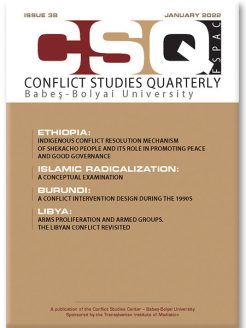
Issue 38 – January 2022
TOPICS: Indigenous conflict resolution methods, Islamic radicalization, conflict intervention, arms proliferation
Coordinator:
Christian Chereji and Ciprian Sandu
Content – Sommaire:

ARTICLES in Issue 38 – January 2022:
Ethiopia: Indigenous Conflict Resolution Mechanism of Shekacho People and Its Role in Promoting Peace and Good Governance
Wasihun Bezabih BEKELE & Admasu Adraro AKAKO
Abstract:
This research sought to explore the Indigenous Conflict Resolution Mechanism (ICRM) of Shekacho people in Sheka Zone, South West Ethiopia. The ICRM of Shekacho has organized procedure, structure, and actors who actively participate in the system. The procedures in ICRM of Shekacho people pass through two sequential phases of conflict resolution—intervention and resolution. However, despite this reality, it has no strong or formal relationship with the modern conflict adjudication system. Thus, this research ague for the provision of support from the government and establishing an enabling system for building a working relationship between the indigenous system and the modern adjudication system. Furthermore, higher academic institutions need to play their role by giving awareness-raising training for concerned stakeholders regarding the role of indigenous knowledge in modern governance.
Keywords:
conflict, indigenous conflict resolution, clan leaders, elders, mikirecho.
DOI: https://doi.org/10.24193/csq.38.1

Islamic Radicalization: A Conceptual Radicalization
Jonathan MATUSITZ
Abstract:
This paper is a conceptual analysis of Islamic radicalization. Islamic radicalization refers to the process of persuading individuals (e.g., often new or potential Muslim recruits) that jihad is the answer to contemporary problems that have undermined the existence or progress of Islam on a global scale. This topic is important because visualizing the issue in this manner enhances our understanding of the Islamic radicalization process. An important conclusion is that such radicalization is efficient because it has been shown to inspire a wide spectrum of individuals to fight the enemies of Islam in Holy War and die for Allah.
Keywords:
Caliphate, communication, framing, fundamentalism, internet, Islam, Islamic radicalization; jihad; Social Movement Theory, terrorism.
DOI: https://doi.org/10.24193/csq.38.2

Burundi: A Conflict Intervention Design During the 1990s
Sezai Ozcelik & Belma ENGIN GUDER
Abstract:
Among many various conflict analysis methods, Dennis J. D. Sandole’s three pillar model presents a systematic road-map to identify the main issues, causes, and conditions of conflicts, as well as third-party conflict intervention approach. Three pillar model is also well suited to the analysis of complex conflict in Burundi and its intervention process by the third parties during the 1990s. This paper touches on the issues, causes, and conditions of Burundian conflict as Sandole’s first and second pillars suggest, but primarily focuses on the intervention aspect in line with the third pillar of the model. In this context, the conflict intervention framework in Burundi is examined based on the regionally launched Arusha peace process, which resulted in a peace agreement. Following that, given the multi-level nature of the conflict in Burundi, it is discussed how an effective conflict intervention can be designed in order to resolve conflicts and ensure positive peace in the country.
Keywords:
Burundi, conflict analysis, Sandole’s Three Pillar Model, conflict intervention.
DOI: https://doi.org/10.24193/csq.38.3

Libya: Arms Proliferation and Armed Groups. The Libyan Conflict Revised
Felix SHIHUNDU
Abstract:
The study critically analyses the effects of the Libyan arms proliferation, with a focus on the Small Arms and Light Weapons (SALW) in the region. It traces the proliferation of arms occasioned by the Civil War in Libya and establishes an empirical link to some of the regional security challenges to the proliferation. Relevant theoretical perspectives, such as the Security Dilemma and the Security Complex Theory, are adopted to explain the resulting effects of the proliferation such as the increased deadly violence of the rebel forces in the region and the neighboring Middle East region. Innovative arms control has been presented as the opportunity for the region to address the security challenges which are quickly evolving into a proliferation of advanced sophisticated weapons, some of them in the rebel-controlled territories. The study concludes that the regional security challenges partly originate from the Libyan arms proliferation which have also worsened security challenges in different parts of the world.
Keywords:
Arms proliferation, Security Dilemma, Libya, Regional Security Complex, arms control, Disarmament, Demobilization and Reintegration.
DOI: https://doi.org/10.24193/csq.38.4

